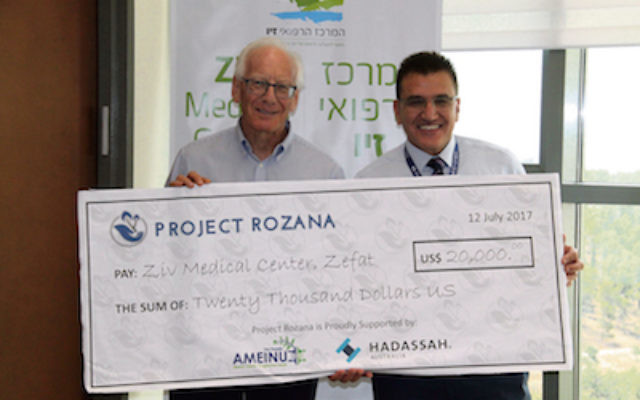Aussie aid for Syrian kids
Israeli doctors struggling to meet the cost of treating children from war-torn Syria were moved last week, when Australian donors and diplomats arrived to given them a cheque for $25,000.
At Ziv Medical Centre in Tzfat, youngsters from Syria are constantly arriving for attention. Israeli authorities help them to get there and pay for care, but the fees fall short of what it actually costs to care for them, and with more than 300 children treated so far, the financial burden is mounting.
Hadassah Australia’s Project Rozana campaign has just raised $25,000, and presented the money – as a USD20,000 cheque – during a special ceremony.
Chairman Ron Finkel told hospital director Salman Zarka as he handed over a supersize cheque that he considers Ziv’s work “an indication of how committed Israelis are to the health, welfare and safety of the Syrians caught up in this appalling and senseless cycle of violence”.
The money handed over was raised during June alone, and Project Rozana hopes to return with more donations. The charity is a multi-faith, humanitarian initiative established in 2013 by Hadassah Australia, which funds, among other medical projects, treatment in Israel of children from centres of conflict in the region.
Project Rozana enlisted help from the US by the New York-based organisation, Ameinu to raise the money.
Zarka told The AJN during the ceremony: “To have funds coming from Australia, so far away from here, is really significant to us and really encourages us to continue.”
He said that his hospital’s work “represents in the Jewish tradition real tikkun olam and follows ideas of care set out in the Talmud, Maimonides and elsewhere.” Zarka, a Druze Arab, added that doctors involved in the care are drawn from every religious grouping in Israel, and also see the work as sacred.
He said that often, doctors treating those from conflict zones stabilise patients but don’t give them full treatment.
At Ziv, the approach is very different, and patients are taken far further along the path towards recovery. “We decided that we will treat Syrians according to Israeli standards,” Zarka said.
Proving Israel is not ‘the devil’
Walking the wards of Tzfat’s hospital, you are reminded that the depressing statistics of the Syrian Civil War don’t tell the whole tragedy.
The two-year-old boy who lies in a bed in a corridor away from the cheque ceremony won’t show up in any figures as he hasn’t lost his life or his home because of the conflict, but his health has suffered badly.
The boy has serious problems with his heart, which should have been treated when he was much smaller, but in a Syria where heath infrastructure has been pulverised, he didn’t get the necessary attention. Now, he’s in a bed in Tzfat, connected to tubes and under constant supervision.
The boy’s mother sits in a chair next to him wearing a hijab, constantly by his side to help care for him and also because she has nowhere else to be – she knows nobody in this strange country apart from the hospital staff. Often, this situation turns staff into a kind of surrogate family, providing emotional as well as medical support.
On these wards the transformations achieved are remarkable – transformations in health, and as a by-product transformations in attitudes.
Hospital director Salman Zarka says it is moving to see Syrians, who grew up on propaganda that Israelis only wish them harm, discover that there are Israelis who want to help them. “People say that for many years they were educated that you are the devil and you need to be kicked out of this country into the sea,” Zarka states.
Anthony Luder, the hospital’s director of paediatrics, speaks about just how “dreadful” some of the injuries from actual fighting have been. “It’s really quite horrifying to see children being caught up in this, losing limbs and losing eyes. Sometimes it’s surprising they make it here.”
One of Luder’s senior physicians is Michael Harari, an Australian immigrant to Israel, who is the first medical contact for many new Syrian arrivals. Harari reports that Ziv is constantly getting better at caring for the Syrians, with all the challenges it entails, saying that “the machinery for running all of this is getting smoother.”
He has admiration, as well as compassion, for his patients, saying: “It’s a threat to their lives to get to the border and a threat to their lives to get across the border.” Ziv has passed junctures when it could decide to reduce or even stop treating Syrians, including in 2014 when Zarka became director.
But Luder reports that in the minds of staff, ending the work isn’t even seen as an option, saying: “There was no question [in 2014] that the hospital would carry on and increase its efforts, simply because it was the right thing to do.”
NATHAN JEFFAY


comments